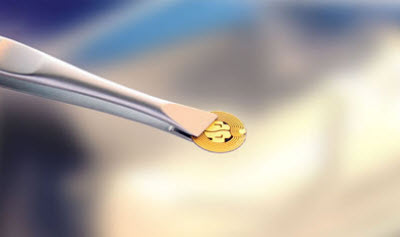
The brilliant thing about chip startup Verayo is that it has figured out how to turn this flaw into an advantage. It turns out that using these minute variations is a good way to uniquely identifying a product and thereby defeat product counterfeiting, which is a rampant problem that leads to $600 billion in losses each year.
[aditude-amp id="flyingcarpet" targeting='{"env":"staging","page_type":"article","post_id":134596,"post_type":"story","post_chan":"none","tags":null,"ai":false,"category":"none","all_categories":"business,","session":"A"}']AI Weekly
The must-read newsletter for AI and Big Data industry written by Khari Johnson, Kyle Wiggers, and Seth Colaner.
Included with VentureBeat Insider and VentureBeat VIP memberships.
Devadas figured out that each chip has minute physical characteristics that are often viewed as manufacturing flaws on an atomic level. But Devadas thought of them as unique, unclonable identifiers that could verify the authenticity of a chip.
If you send an electrical signal into a chip, you will get a unique response that comes back. That response is different for other chips, and so every response is unique because every chip has different physical unclonable functions, or PUFs. The good thing about these PUFs is they are cheap; they are tiny circuits that add virtually no cost to a chip.
With this authentication system, the possibilities in anti-counterfeiting systems are big. You can put RFID tags on pill bottles to make sure they are tamper-proof. If someone has changed a pill bottle en route and substituted fake pills, the challenge-response security routine will detect the fake. The device could also be used to issue an exact number of tickets for a transit system.
In October, 2008, the company announced its first unclonable identification chips. Based on customer feedback, the company revised the chips to make them compatible with standard RFID reader systems and cell phones. Verayo also improved its radio for better readability. That revision process took months and the company is now engaged with customers about full-scale production.
[aditude-amp id="medium1" targeting='{"env":"staging","page_type":"article","post_id":134596,"post_type":"story","post_chan":"none","tags":null,"ai":false,"category":"none","all_categories":"business,","session":"A"}']
The key-generation system can also be used in near-field communications, which allows someone to pay for a physical product with a cell phone. In these devices, authenticating a user’s phone is a must. Agrawal said the company is in trials now for its secure RFID tags with three big liquor companies, a cigarette company, and a transit authority. It is already providing tags to the equivalent of the Food and Drug Administration in China. The key systems can also be used in networking hardware, electronic passports, and credit cards.
Agrawal spent 17 years at Sun Microsystems before moving on to startups. He was previously the chief executive of inSilica, a custom chip maker that used low-cost teams in India and Slovenia to design chips. Verayo’s sole investor is Khosla Ventures. Verayo is raising a second round of money now.
VentureBeat's mission is to be a digital town square for technical decision-makers to gain knowledge about transformative enterprise technology and transact. Learn More
